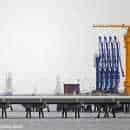India green lights clinical trials of Akston Biosciences’ second-generation vaccine

![]() India -India kicks off clinical trials for the second generation Covid-19 vaccine of the US-based Akston Biosciences. The US firm has announced that the first 100 subjects were done in an open-label in India.
India -India kicks off clinical trials for the second generation Covid-19 vaccine of the US-based Akston Biosciences. The US firm has announced that the first 100 subjects were done in an open-label in India.
The open-label study or AKS-452 is based on the protein subunits of the Covid-19 candidate. The doses are shelf-safe for at least six months at room temperature and are able to maintain potency for one month.
It will be a big step for India to be able to procure a good deal with the firm as the drug controller of India has given nod for the open-label bridging story, which is being conducted by the Supe Heart and Diabetic Research Centre in Nashik.
The study is also being conducted in four other locations in Maharashtra and also in Ahmedabad’s Veeda Clinical Research. The study is different from the currently practiced research subject in the sense that it does not include mRNA in the counter technology or vaccine defense.
Related Posts
The CEO of the Akston Biosciences stressed the efficiency of the vaccine. “As a second-generation vaccine, AKS-452 has the potential to more easily safeguard the health of populations worldwide against Covid,” he said.
He also added that the formulation has been done in such a way that it can be very well tolerated for the primary vaccination and boosting during the immunity diffusion. In India, the role to monitor and supervise the trials is led by Pravin Dinkar Supe, the founder of the Nashik Hospital.
He also emphasized the efficiency of the vaccine citing the results from the Phase eII trials in the Netherlands. He counted the benefits the vaccine will do for India in comparison to the already available options saying that the protein subunit is being introduced in India to make a low-cost, temperature-resistant vaccine available for all. It is extremely beneficial for countries that are struggling economically especially those parts of Africa and Asia. “These countries lack the infrastructure to transport and store the currently approved vaccines that require ultra-cold conditions.”



